Author Interview: “Embattled” — Can Ancient Greek Myths Help Us Resist Tyranny?
By Bill Marx
“By cultivating our capacity for empathetic critical inquiry, Greek myths caution us against entertainers, pundits, politicians, and journalists who are trying to inflame our anger and fear.”
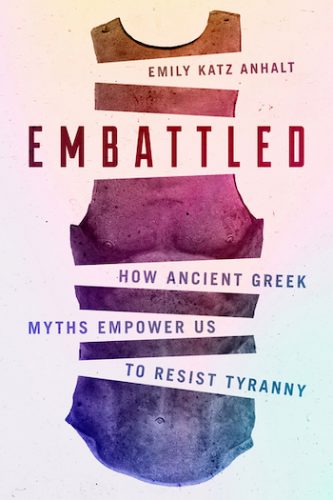 I am on record as believing that Greek tragedy can help us make sense of the global challenges we face today, including the climate crisis. So I was immediately drawn to classicist Emily Katz Anhalt’s volume Embattled: How Ancient Greek Myths Empower Us to Resist Tyranny (Stanford University Press, 306 pages, $30). Could ancient Greek texts limning the dangers of tribalism and collective deception be of help to us in perilous times, with authoritarianism and tyranny growing in power and influence internationally and with democracy in this country — designed by Founding Fathers who were deeply familiar with the Greeks’ experiment — coming under increasing pressure?
I am on record as believing that Greek tragedy can help us make sense of the global challenges we face today, including the climate crisis. So I was immediately drawn to classicist Emily Katz Anhalt’s volume Embattled: How Ancient Greek Myths Empower Us to Resist Tyranny (Stanford University Press, 306 pages, $30). Could ancient Greek texts limning the dangers of tribalism and collective deception be of help to us in perilous times, with authoritarianism and tyranny growing in power and influence internationally and with democracy in this country — designed by Founding Fathers who were deeply familiar with the Greeks’ experiment — coming under increasing pressure?
The answer is yes. Anhalt retells and freshly interprets decisive stories in Homer’s Iliad and Odyssey and dissects the central conflicts in Aeschylus’s Oresteia and Sophocles’s Antigone. Along the way, she offers interesting readings that suggest that these texts reflect a fascinating (perhaps unconscious?) cultural struggle to arrive at the concept of democracy. For example, Anhalt does not think Antigone neatly fits Hegel’s classic definition of a tragedy — that it is about the clash of right versus right. Nor does she see the play, as some do today, as a powerful celebration of feminism. For her, the drama cautions us against the seductions of intractability: “Reject opposing views, embrace violence — behave, in short, exactly like a tyrant — and you will achieve only destruction.” Her exegesis of Greek myths and stories is often driven by her belief that they are best appreciated today as negative examples. These visceral fables show where arrogance, dogmatism, abuse of power, and unfettered self-interest inevitably lead. The Greeks were not handed a way to respond to the disease of domination — they were invited to imagine alternatives. And that is what the best drama does: it makes us dream greater.
I emailed some questions raised by Embattled to Anhalt, a professor of Classics at Sarah Lawrence College, and she was kind enough to supply some detailed responses. Yes, I wanted to explore how the ancient Greeks grappled with the difficulties of self-governance, but I also felt that she needed to field objections, from within and outside of academia, that the ancient Greeks were too belligerently patriarchal, too privileged, to be of value to an enlightened society. What about the harm done by groups such as the incels, who draw on these myths and texts to justify misogyny and male supremacy? And I could not resist taking Anhalt to task for omitting my favorite Greek dramatist, Euripides. The Bacchae has some mighty intriguing things to say about mass hypnosis and democracy.
The Arts Fuse: What is the most important lesson that Homer, Aeschylus, Sophocles have to teach modern democratic societies, especially in inoculating them from demagogues? Is there something they alone can tell us?
Emily Katz Anhalt: Homer, Aeschylus, and Sophocles can inoculate us against demagogues by cultivating our capacity for empathy and evidence-based critical thinking. Today, worldwide, we’re seeing increasing political polarization and the introduction or reintroduction of violence and intimidation into the political process. We’re experiencing an accelerating slide toward authoritarianism or authoritarian populism. By contrast, ancient Greek myths initiated and promoted — over many centuries — an unprecedented movement in the opposite direction: away from tribalism, away from autocracy and toward broader forms of nonviolent political participation, exemplified most famously by the Athenians’ direct democracy of the 5th century BCE.
Greek myths, told in Homer’s Iliad and Odyssey and in Athenian tragic plays, warn us today, as they warned their original audiences in the 8th-5th centuries BCE, to take responsibility for our own choices and their likely consequences, to assess facts on their merits, and to view abuses of power as not merely destructive but self-destructive. The Odyssey in particular emphasizes a direct connection between lying, political violence, and autocracy. In the US, we’re seeing this connection first hand, but the Greeks had this insight more than 2,000 years ago.
By cultivating our capacity for empathetic critical inquiry, Greek myths caution us against entertainers, pundits, politicians, and journalists who are trying to inflame our anger and fear. Anger and fear convince us of the moral correctness of our own views and prevent us from learning or discovering better ideas. They can even incite us to commit atrocities. But empathetic critical thinking is effortful. It’s easier to ignore the needs and feelings of others and to let forceful, authoritative, charismatic leaders do our thinking for us. History suggests that human beings are susceptible to autocratic leadership and that we’re likely to assume that demagogues and autocrats have our best interests at heart — when in fact such individuals typically seek to benefit themselves at others’ expense. By increasing our anger and fear, demagogues deceive us into demonizing people who disagree with us, mistaking revenge for justice, and outsourcing our own well-being. Greek myths, however, encourage us to beware of our own capacity for tyrannical behavior, and to see nothing admirable in the violent or abusive behavior of others.

Emily Katz Anhalt. Photo: Jimmy and Dena Katz
AF: Many, particularly young people, will dismiss ancient Greek society because, as you point out, it was patriarchal, misogynistic, xenophobic, and bellicose. Even after it developed the first democracy. What is your defense — given how Homer and company have been used to reinforce reactionary thinking?
EKA: We absolutely have to condemn the ancient Greeks as patriarchal, misogynistic, xenophobic, and bellicose — as we must condemn such abuses of power at all times and in all places, but we also have to realize that we are condemning the ancient Greeks by standards that their own mythical tales introduced. Over many centuries, ancient Greek myths cultivated their audience’s awareness of the essential humanity of every human being. They emphasized the one thing that we all share, regardless of our gender, ethnicity, wealth, or status: our vulnerability to suffering and death. Early in the Odyssey, Athena, goddess of wisdom, explains, “Death, you know, is an impartial thing. Not even the gods can ward it off even from a man who is dear to them, whenever indeed the destructive fate of prostrating death overcomes him” (Od. 3. 236-238). The values of humanity, justice, and equality originate in that most fundamentally egalitarian insight.
Ancient Greeks often abused their power, but their own epics and tragedies explicitly expose abuses of power as self-defeating. The Odyssey, for example, emphasizes the variability of human fortunes and the consequent foolishness of mistreating people over whom you currently have power. The epic’s protagonist, Odysseus, a king and a conquering warrior, has been reduced to a wandering, destitute beggar. In his long absence from home, suitors for his wife have taken over his household. Well-born, wealthy, and numerically superior, these suitors are consuming Odysseus’s property uncontrollably and mistreating his family, servants, and slaves. Failing to recognize the returning king, the suitors insult and even assault Odysseus. Currently powerful, these offensive, unrestrained young men ignore numerous warnings and get themselves slaughtered. By abusing their power, they bring destruction on themselves.
Ancient Greek epics and tragedies remind us that humanity, justice, and equality don’t require some extraordinary selflessness but only a clear understanding of our own self-interest. The Framers of the US Constitution recognized that human beings are self-interested creatures. They tried to design a system in which, as they said, “ambition would check ambition,” or as Adams put it, they tried to craft a government of laws, not of men. But we know — and ancient Greek history shows — that legislation can only get you so far. Laws and institutional reforms are useful and necessary but not sufficient to prevent abuses of power. The genius of the ancient Greek tales is to emphasize that humanity, justice, and equality are actually in our own self-interest, as individuals and as members of communities. The ancient Greeks didn’t live up to the humane, egalitarian ideals promoted by their own myths. But their stories show us how we could and why we should.
AF: You talk about how ancient Greek culture has become a pawn in the culture wars of the 21st century. Your book is part of that engagement in interpreting the past. What is at stake in this contest?
EKA: The stakes couldn’t be higher, because today’s modern culture warriors deploy cutting-edge 21st-century technology to promote violence and intimidation, humanity’s most primitive and destructive tools. By blinding us to reality and empirical evidence, extremist ideologies erode our capacity for the logical thought and good faith verbal argument essential for constructive democratic decision-making. By ignoring, falsifying, or distorting evidence, extremists undermine the concept of objective truth and make verbal persuasion and creative compromise impossible, promoting instead violence and intimidation as the only available methods for resolving disagreements. Tragically, culture warriors have co-opted ancient Greek (and Roman) literature and history for their own partisan agendas. At one extreme, uncritical claims of ancient Greek cultural superiority falsify the reality, ignore the self-criticism manifest in ancient Greek literature, and promote tyrannical oppression and exclusion. At another extreme, the rejection of ancient Greek history and literature robs us of instructive examples, depriving us of invitations to self-reflection, constructive debate, and creative problem-solving.
The effort to derive useful insights from history and literature requires examining evidence and assessing it on its merits. That conception of constructive, critical engagement with the past is a peculiarly Greek concept. The Homeric epics, for example, our earliest surviving sources from ancient Greece, are already reinterpreting stories understood by the Greeks as their own past history. Already in the Iliad and Odyssey, tales of the Trojan War have become stories of suffering and loss, for victors and vanquished alike. Even the Iliad, set during the Trojan War, emphasizes not the glory of violent conquest but the devastations of defeat. The Odyssey, with its self-confessed deceitful protagonist, cultivates our ability to distinguish reality from fantasy and fact from fiction. Matching wits with Odysseus, narrator of numerous fantastical and deceptive tales within the epic, we develop our capacity to distinguish truth from lies, a most vital skill for resisting autocrats and would-be autocrats.
By dramatizing ancient, traditional stories, the tragedies, too, brought the past into the present and invited audiences to assess evidence and reassess traditional certainties. Homer’s characters glorify violent revenge, for example, equating vengeance with justice, but Aeschylus’s Oresteia (produced 458 BCE) shows the audience that vengeance is interminable and ever-escalating, productive not of justice but of chaos. The distinction between vengeance and justice isn’t usually obvious to people who mistake revenge for justice. Aeschylus makes it obvious. Aeschylus shows that a communal judicial procedure offers a healthier alternative to the traditional vendetta and enables a zero-sum definition of victory (“I win; you lose”) to evolve into a conception of victory defined as a win for all concerned. The challenge for us, of course, is to ensure that judicial procedures function equitably. Otherwise, as we know, and as the Oresteia suggests, the spirit of bloodthirsty revenge reemerges as violent as ever. Many modern culture warriors refuse to reevaluate even their most toxic assumptions and prejudices, but Greek history and literature offer us potentially life-saving invitations to critical reflection and self-reflection.
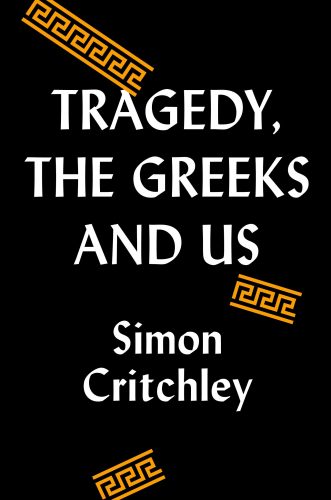 AF: You write that the Iliad, Odyssey, Oresteia, and Antigone encourage critical thinking and are of practical use for society. But philosopher Simon Critchley argues that tragedy is neutral, in his book Tragedy, the Greeks, and Us: “Tragedy is neither simply affirmative or negative, neither optimistic or pessimistic. It cannot be defined by affixing either a plus or a minus sign. And such oppositions are pretty fatuous…. It gives us a genealogy of who we are, an account of our origins and how the curse of the past can unknowingly take shape in the present, and we don’t see it and we rage when we are told what it is.” How would you respond to this point of view?
AF: You write that the Iliad, Odyssey, Oresteia, and Antigone encourage critical thinking and are of practical use for society. But philosopher Simon Critchley argues that tragedy is neutral, in his book Tragedy, the Greeks, and Us: “Tragedy is neither simply affirmative or negative, neither optimistic or pessimistic. It cannot be defined by affixing either a plus or a minus sign. And such oppositions are pretty fatuous…. It gives us a genealogy of who we are, an account of our origins and how the curse of the past can unknowingly take shape in the present, and we don’t see it and we rage when we are told what it is.” How would you respond to this point of view?
EKA:I completely agree with Simon Critchley that tragedy does not promote a simply affirmative or negative view of human existence. Tragedies identify our fundamental weaknesses — our vulnerability to suffering and death — and our greatest strengths — our capacity for courage in the face of adversity and our ability to recognize our shared need to respect our obligations to one another.
Greek tragedies are not a source of dogmatic truth but an invitation to think deeply and constructively about fundamental moral issues. The ancient Greeks had this remarkably innovative and crucial insight: that people could learn from experience. Even better, they realized that people could learn from other people’s experience. Stories told in the Homeric epics and in Greek tragedies give us, as they gave the ancient Greeks, a place to stand — outside ourselves. These stories aren’t directly about us so we can assess the characters’ words and conduct without our own passions interfering with our thinking.
Lacking direct vested interest in the outcomes of these tales, we can evaluate the characters’ decisions more objectively. My work is premised on the realization that the stories we read, watch, or tell shape our attitudes and priorities. They teach us what to admire and what to condemn. And the crucial lesson from the ancient Greeks and their myths is that you can make all the economic and institutional changes that you want, but unless you address the human tendency to abuse power, you are not going to find yourself living in a desirable, flourishing community. In practice, as we know, democratic procedures and institutions can easily promote tyrannical abuses of power and even atrocities.
Greek tragedies, like the Homeric epics, emphasize that human attitudes and values, not the gods or fate, or even democratic institutions, determine the quality of life in any community. Sophocles’s Antigone, for example, offers a cautionary warning for our own deeply polarized political moment: both protagonists in this play are so sure of their own moral correctness that neither can take in good advice or think creatively. In their anger and absolutism, they destroy not only themselves but also their family and community. Rather than offering pessimism or optimism, I’d say that the tragedies offer us a challenge: persist in our headlong rush to self-destruction or get creative, develop some self-restraint, become wiser.
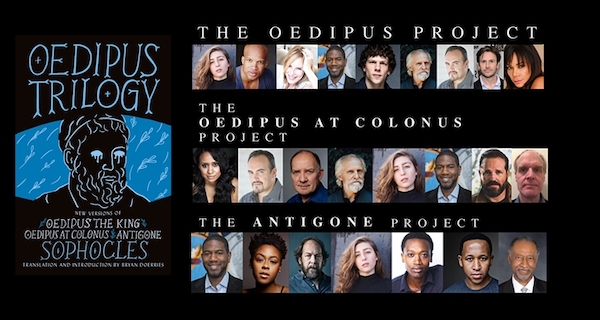
AF: Bryan Doerries, the producer of Theater of War productions, has been staging readings of scenes from Greek tragedies to encourage public dialogue. He believes that “by showing people just how narrow and fleeting their power to determine their own future was, the tragedies discouraged apathy. Highlighting how devastating self-delusion can be encouraged awareness. And providing the language for describing difficult experiences enhanced agency.” Would you agree?
EKA: Absolutely. Bryan Doerries does us all a tremendous service by making these ancient works present for modern audiences in a powerfully moving and accessible way. Today ancient Greek tragedies can seem too remote and foreign to be useful to us. In their own times, however, they were a vital democratizing force, reaching not merely an educated few but vast, if not universal, Greek audiences.
Doerries’s staged readings and public discussions, like the original ancient Greek productions, encourage us to take responsibility for our words and actions and their consequences. Tragedies remind us that human life exists within fixed constraints. We’re mortal and subject to forces far more powerful than we are. The Greeks identified these forces as divinities. (We might term them the laws of physics, DNA, luck.) Athenian tragedies all suggest that since all (or even most) aspects of human existence are not within our control we’d be wise to concentrate on the ones that are. Mortal characters within the plays often blame the gods for events that the audience can see derive from the characters’ own choices. Doerries’s vivid, engaging productions urge us not only to take responsibility for our own actions but also to develop our ability to foresee their — usually predictable — consequences. By revitalizing these stories and refamiliarizing us with the plays, Doerries’s work helps us, as the Athenian originals helped the ancient Greeks, to address trauma, develop empathy, and cope constructively with both success and failure,
AF: You write that the Iliad, Odyssey, Oresteia, and Antigone “remind us to ask ourselves continually, ‘Who is telling me this? What is his or her agenda? Whom does it benefit? Whom does it harm? Do the facts support the claims?'” That sounds surprisingly modern. Given that these works strengthen us against accepting the “falsehoods, direct threats, and incitement to violence” generated by “social media and mainstream new sources,” how would you like to see these and other classics taught or staged?
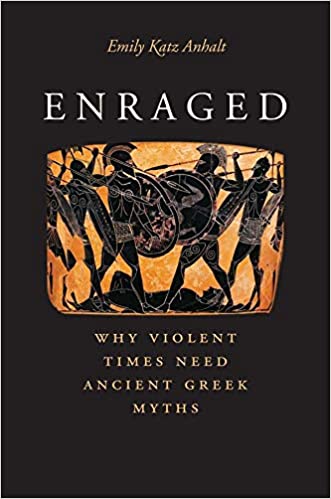 EKA: The great challenge in bringing these works to modern audiences is to avoid projecting onto them our own prejudices and certainties. We inevitably bring ourselves to whatever we read or watch, and this can make it difficult for us to see — and to learn from — what’s actually there.
EKA: The great challenge in bringing these works to modern audiences is to avoid projecting onto them our own prejudices and certainties. We inevitably bring ourselves to whatever we read or watch, and this can make it difficult for us to see — and to learn from — what’s actually there.
As a consequence of fascist and totalitarian movements in the 20th and 21st centuries, for example, we may misinterpret Sophocles’s Antigone as a story of one woman’s brave stand against the overwhelming power of a tyrannical state. This reductive assessment may admirably affirm our preexisting love of individual freedom and loathing for misogyny and abusive state power, but it also can make us miss the point of Sophocles’s play. A translation, interpreting the Greek according to the translator’s own preconceptions, can reinforce the misreading. Read in Greek, however, Antigone contains a far more useful message for Sophocles’s contemporaries and for our own volatile and polarized political moment: both protagonists affirm essential values that the community neglects at its peril, but both also pursue their objectives in counterproductive ways and bring destruction on themselves, their family, and their community. Both protagonists are so sure of their own moral correctness that neither can take in good advice or think creatively. Consumed by anger and moral certainty, the two protagonists collide and self-destruct. I’d love to see a modern production exposing the Antigone’s exploration of the competing claims of family obligations and civic responsibilities. I’d love to see a modern production that emphasizes the plays powerful warning against tyrannical extremism and its implicit invitation to open-minded, creative problem-solving.
Greek tragedy was a form of “theater of protest” but it wasn’t “theater of protest” in the modern sense of protest against the status quo. Ancient Greek tragedy was state-sponsored, and it encouraged critical moral reflection and self-criticism. The genre institutionalized self-criticism in the Athenian democracy of the 5th century BCE. I can think of nothing more essential to the preservation of egalitarian democratic values and institutions than the capacity for critical moral evaluation and reevaluation of tradition certainties, even democratic certainties.
AF: Among the many values extolled by the Greek myths, the most refreshing for me was the demand for restraint. Given modern society’s unquestioned belief in the inevitable march of progress, the endlessness of possibility, and the perpetual abundance of nature, it testifies to a rare virtue: the need to respect limits. How pervasive was this belief in restraint in Greek society and culture?
EKA: Given the ubiquity of epic tales in archaic and classical Greece, I suspect that belief in the value of restraint was pervasive — but honored more in the breach! Unlike human beings, gods need no self-restraint, and the epics and, later, the tragedies, all present gods as countermodels for human beings. Gods experience no limits in space or time. With complete impunity, gods can do whatever they choose. As human beings, by contrast, we are entirely vulnerable to suffering and death. Unlike gods, we are constrained by forces outside us and within us. We are not immune to the consequences of our own actions. Yielding without restraint to our appetites and passions may feel satisfying at the time, but these stories all encourage us to think longer term. They remind us that by indulging our most aggressive and selfish impulses in the moment we imperil our future happiness and survival.
Early in the Odyssey, for example, Zeus complains that human beings blame gods for their troubles but actually bring more trouble on themselves. Zeus doesn’t deny that gods bring trouble, but his statement — heard by the epic’s external audience but not by its mortal characters — encourages us to focus on those choices and actions that are within our control. Mortal characters in the stories often blame the gods for their misfortunes, but the audience sees that much, if not most of the suffering results not from divine actions but from mortals’ own self-destructive decisions.
By focusing our attention on the mortals’ decisions, these stories expose the foolishness of thinking that you can behave without restraint and even hurt others with impunity. For Greeks, that was the very definition of hybris. English has adopted the Greek word hybris [“hubris”] but transformed it to mean something like “pride” or “arrogance,” with “humility” as its English opposite. But the Greek word hybris means an outrageous, usually violent act against another person that results in harm to the perpetrator. It’s easy to see how we might come to think of that as arrogance, because in order to commit hybris, you have to believe that you are like a god, that is, immune to the consequences of your own abusive action. But ancient Greek epics and tragedies all expose hybris as self-destructive. The opposite of the Greek word hybris is not humility but another untranslatable word, sophrosyne. Sophrosyne incorporates various English terms: wisdom, prudence, chastity, moderation, even self-restraint. As the antithesis of hybris, sophrosyne encompasses all of the qualities that maximize your chances for survival and success. We don’t have an English equivalent to sophrosyne — and I find that lack quite revealing and disturbing. Our modern enthusiasm for and admiration for self-indulgence in our passions and appetites currently puts our communities, our planet, our very survival at risk.
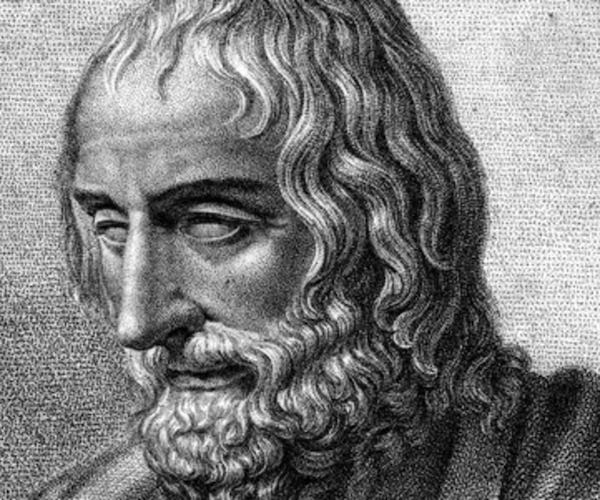
Euripides — the Athenians frequently wanted to hear what Euripides had to say, but they didn’t always like it.
AF: I was sorry to read that one of my favorite dramatists, Euripides, was excluded from Embattled because his tragedies date “well after the transition to radical democratic government in Athens was already complete.” You write perceptively about Hecuba in your book Enraged: Why Violent Times Need Ancient Greek Myths. Any thoughts on what Euripides would contribute to your argument about how Greek myths can help us resist tyranny?
EKA: To be honest, my decision to omit Euripides from Embattled was more practical than principled. The book was already too long (!), and I hope to do a similar book exclusively on Euripides. Euripides definitely fosters attitudes and skills vital for resisting tyranny. Like Homer, Aeschylus, and Sophocles, Euripides cultivates not only our ability but above all our desire to resist tyranny. Euripides helps to fortify us against extremist ideologies of today that threaten to obliterate our capacity to learn from experience.
Like other tragedies, Euripides’s plays use ancient stories to examine contemporary moral issues. Euripides was extremely innovative in reworking traditional source material, often introducing novel characters, plot elements, and themes. His plays have a powerfully democratizing effect in that they expose the thoughts and feelings of all sorts of people, not just the noble or well-born, but ordinary people — servants, slaves, women, elderly people.
Sensitive to the capacity of individuals and even democratic institutions to abuse power and even commit atrocities, Euripides regularly reminds us that time inevitably brings change. You might be in power today but subject to someone else’s power tomorrow. Today you’re the avenger; tomorrow you’re the victim of the next avenger. Since ancient Greek slavery wasn’t based on race, you could be royalty one day and enslaved the next, if your community was captured in war. Euripides’s Trojan Women, for example, set during the aftermath of the Trojan War — a long-ago conflict for Euripides’s contemporaries — warns against long-range, opportunistic conquest and exposes the self-destructiveness of behaving without self-restraint in victory. This play provides a cautionary lesson not only for military conquerors but also for political parties, political office-holders, and even ordinary voters. The Ion, to take another example, directly critiques the Athenians’ own xenophobia, exclusiveness, and sense of ethnic and cultural superiority. The Bacchae exposes the deadly costs of fanaticism and intellectual and religious extremism.
Euripides’s contemporaries seem to have found his plays more irritating and abrasive than those of Aeschylus and Sophocles. Euripides was often granted a chorus — that is, government magistrates selected his plays to be financed and performed — but he rarely won in the tragic contests. This attests to a healthy acceptance of criticism and dissent within ancient Athens, since the Athenians frequently wanted to hear what Euripides had to say, but they didn’t always like it. This welcoming of verbal dissent wasn’t sufficient to tolerate Socrates, ultimately, but it offers a constructive model for individuals in modern societies hoping to preserve nonviolent democratic decision-making. We have to be able not only to tolerate but also to learn from and address opposing viewpoints. Euripides can help us recognize that unlike physical conflict, verbal conflict can be constructive. Euripides’s plays, like Homer’s epics and the tragedies of Aeschylus and Sophocles, enable us to see verbal dissent and disagreement — the heartbeat of democratic politics — as an opportunity to defend and even improve our values and policies.
Bill Marx is the Editor-in-Chief of the Arts Fuse. For just over four decades, he has written about arts and culture for print, broadcast, and online. He has regularly reviewed theater for National Public Radio Station WBUR and the Boston Globe. He created and edited WBUR Online Arts, a cultural webzine that in 2004 won an Online Journalism Award for Specialty Journalism. In 2007 he created the Arts Fuse, an online magazine dedicated to covering arts and culture in Boston and throughout New England.

Great article.
As much as times have changed, people essentially have not.
Our chariots and tablets are just have moire she-bang.
We’ve much to learn from the Greek writers and philosophers.